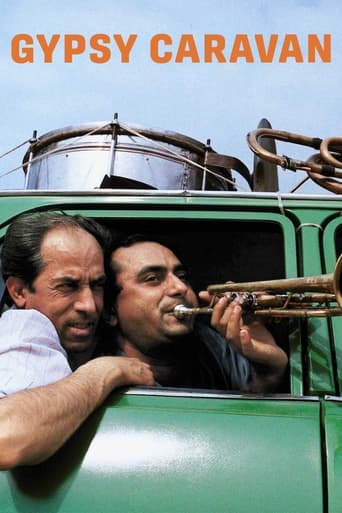

Self-important, over-dramatic, uninspired.
... View MoreHorrible, fascist and poorly acted
... View MoreThe performances transcend the film's tropes, grounding it in characters that feel more complete than this subgenre often produces.
... View MoreAn old-fashioned movie made with new-fashioned finesse.
... View MoreThis fascinating, insightful and moving film does for the Roma what The Buena Vista Social Club did for the musicians of Cuba.In allowing the leading characters room to tell their own tales the director, Jasmine Dellal, gives us, the viewer, the opportunity to see into a culture which is at one and the same time foreign and similar. Foreign because of the history, traditions and music of the Roma people, similar because of the everyday problems faced by them, be they lack of money, poor housing, ignorance, fear etc - ie all the things that make all of us human.Out of this emerges some unforgettable characters, like Esma. Esma is the Queen of the Gypsies - officially apparently - and has a voice to die for, clear, soulful, and with more talent than a 1,000 X factor winners put together! Maharaja are an Indian ensemble which has fun playing up to the Bollywood imagery, whilst turning out some of the best Raga I've heard since the heydays of Ravi Shanker! Of course there are others, all of whom are allowed their space within the film, but the saddest has to be the violin maestro Nicolae Neacsu, an elderly man I would have been proud to have called uncle. For those who have not as yet seen the film I will not say what happens, but those who have must agree it is very moving.If there are any faults with the film it is these: Firstly, the relationship between the wider American society and the touring Roma could have been better explored - just one note left in an hotel reception guest book gives a chilling reminder of the ignorance still surrounding these people. Secondly, the film could have been 30 minutes longer and given us more of the concert footage. I guess I will just have to hunt out the soundtrack to hear all of the wonderful music from the film.
... View More"Gypsy" has long been for gadjos synonymous with murder and theft. Not so after Gypsy Caravan, a documentary about musical Romani bands from four countries touring to sold out audiences, who react enthusiastically to the varied and energetic performances by a naturally charismatic people, whose fleshy elders personify the lusts of living apparent from their blistering violin playing to their indulgences in fried food and eccentric marriages.It is not possible to ignore the Gypsies' charisma: Unforgettable is Esma Redzepova, a heavy Macedonian diva who occupies the heart of the film's message about an often maligned culture being rehabbed in front of our eyes by charming music and dance. Her 47 adopted kids are testimony to the holding power of Gypsy family; she couldn't possibly be called anything but "Queen of the Gypsies." Part of the enchanting mood is due to the lensing of the famous documentarian Albert Maysles, along with Alain de Halleux, who captures the folds and creases of older faces along with the freshness of babies and energy of teenage performers. Legendary performer Taraf de Haidouks holds a wedding for his 13-year-old daughter that involves an entire Romanian village, as appropriate a symbol of the enduring love and charm of the Gypsy culture.
... View MoreChris Knipp has it exactly right in his comment above. "Latcho Drom" is one of the best films I've ever seen, the ultimate presentation of Rom music, and it's a crime that it is still not released on DVD. This clunker is almost embarrassingly bad. The producers of the "Caravan" rounded up a motley assortment of "gypsy" acts, some good, some awful, and made a cheapo roadshow with them. The camera work is amateurish, and the disrespect of beginning any performance only to cut away to jolly tour bus or village scenes is infuriating. The director had no sense of how to film music, taking either a flat view from audience front center, or extreme close-ups full of sweat rivulets and nostril hair (not that there's anything wrong with that!). The Spanish flamenco act is particularly cringe-worthy. When you've seen great film scenes of major flamenco talent, such as in the classic works of Carlos Saura, "Antonio" and his aunt Juana appear grotesquely clownish. Antonio performs like someone out of a "Spinal Tap" sort of parody, and his inarguably ugly aunt is presented as some sort of flamenco earth-mother, though her singing is less authentic than awful. The only redeeming moment comes at the end of the film when the audience is shocked and saddened at the unexpected death of one of the performers, and it really is painful to watch the friends' grief. Even then, on second thought, there's something cheesily exploitative about it all.
... View MoreSome of the above writers are overreacting to the word "Gypsy." Sure it's etymologically and ethnologically inaccurate, but names for ethnic groups often are. How about "American Indian?"Actually, when speaking English, many Roma themselves seem to have little or no problem referring to themselves as "Gypsies." Likewise, ask an American Indian what he/she would like to be called and you may be surprised to find that most of them would prefer "Indian" over "Native American," "American Aborigine," or whatever. I think some well-intended non-Indians and non-Gypsies just decided for themselves that these names are offensive, without even actually asking the effected peoples themselves.Besides, you should know that the Romany word used for non-Roma, Gadjo, is unquestionably of a pejorative connotation (in contrast to, say, "Gentile"), reflecting the fact that in traditional Roma culture the Gadjo are considered unclean (which is exactly what the word means). Furthermore, though it may not be politically correct to say so, the fact of the matter is that in the traditional culture the Gadjo are to be strictly avoided, unless they can somehow be exploited for the benefit of the Roma. Do some serious research into Romany culture before you summarily doubt this.So don't be so uptight. "Gypsy," when you get right down to it, is really just the English Language name for a Roma person, just as "Niemiec," meaning one who just doesn't understand or get it (and is by inference an outsider) is the word in Slavic languages for a German, and just as the word "Slav" is the source of the word for slave in most western languages. I mean, how politically incorrect is that?
... View More